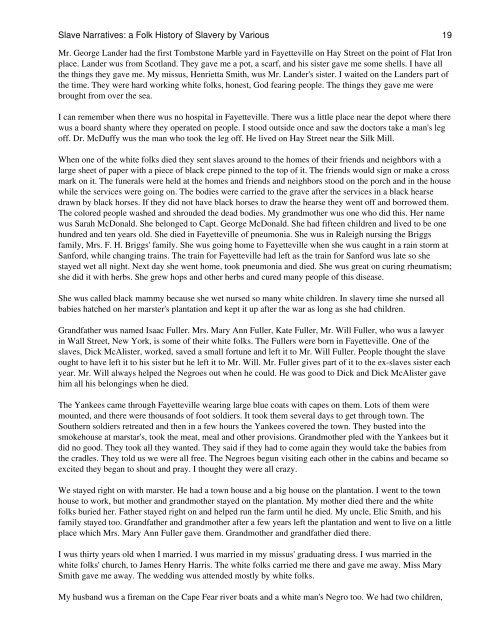Slave Narratives: a Folk History of Slavery in the United States
Slave Narratives: a Folk History of Slavery in the United States
Slave Narratives: a Folk History of Slavery in the United States
You also want an ePaper? Increase the reach of your titles
YUMPU automatically turns print PDFs into web optimized ePapers that Google loves.
<strong>Slave</strong> <strong>Narratives</strong>: a <strong>Folk</strong> <strong>History</strong> <strong>of</strong> <strong>Slave</strong>ry by Various 19Mr. George Lander had <strong>the</strong> first Tombstone Marble yard <strong>in</strong> Fayetteville on Hay Street on <strong>the</strong> po<strong>in</strong>t <strong>of</strong> Flat Ironplace. Lander wus from Scotland. They gave me a pot, a scarf, and his sister gave me some shells. I have all<strong>the</strong> th<strong>in</strong>gs <strong>the</strong>y gave me. My missus, Henrietta Smith, wus Mr. Lander's sister. I waited on <strong>the</strong> Landers part <strong>of</strong><strong>the</strong> time. They were hard work<strong>in</strong>g white folks, honest, God fear<strong>in</strong>g people. The th<strong>in</strong>gs <strong>the</strong>y gave me werebrought from over <strong>the</strong> sea.I can remember when <strong>the</strong>re wus no hospital <strong>in</strong> Fayetteville. There wus a little place near <strong>the</strong> depot where <strong>the</strong>rewus a board shanty where <strong>the</strong>y operated on people. I stood outside once and saw <strong>the</strong> doctors take a man's leg<strong>of</strong>f. Dr. McDuffy wus <strong>the</strong> man who took <strong>the</strong> leg <strong>of</strong>f. He lived on Hay Street near <strong>the</strong> Silk Mill.When one <strong>of</strong> <strong>the</strong> white folks died <strong>the</strong>y sent slaves around to <strong>the</strong> homes <strong>of</strong> <strong>the</strong>ir friends and neighbors with alarge sheet <strong>of</strong> paper with a piece <strong>of</strong> black crepe p<strong>in</strong>ned to <strong>the</strong> top <strong>of</strong> it. The friends would sign or make a crossmark on it. The funerals were held at <strong>the</strong> homes and friends and neighbors stood on <strong>the</strong> porch and <strong>in</strong> <strong>the</strong> housewhile <strong>the</strong> services were go<strong>in</strong>g on. The bodies were carried to <strong>the</strong> grave after <strong>the</strong> services <strong>in</strong> a black hearsedrawn by black horses. If <strong>the</strong>y did not have black horses to draw <strong>the</strong> hearse <strong>the</strong>y went <strong>of</strong>f and borrowed <strong>the</strong>m.The colored people washed and shrouded <strong>the</strong> dead bodies. My grandmo<strong>the</strong>r wus one who did this. Her namewus Sarah McDonald. She belonged to Capt. George McDonald. She had fifteen children and lived to be onehundred and ten years old. She died <strong>in</strong> Fayetteville <strong>of</strong> pneumonia. She wus <strong>in</strong> Raleigh nurs<strong>in</strong>g <strong>the</strong> Briggsfamily, Mrs. F. H. Briggs' family. She wus go<strong>in</strong>g home to Fayetteville when she wus caught <strong>in</strong> a ra<strong>in</strong> storm atSanford, while chang<strong>in</strong>g tra<strong>in</strong>s. The tra<strong>in</strong> for Fayetteville had left as <strong>the</strong> tra<strong>in</strong> for Sanford wus late so shestayed wet all night. Next day she went home, took pneumonia and died. She wus great on cur<strong>in</strong>g rheumatism;she did it with herbs. She grew hops and o<strong>the</strong>r herbs and cured many people <strong>of</strong> this disease.She wus called black mammy because she wet nursed so many white children. In slavery time she nursed allbabies hatched on her marster's plantation and kept it up after <strong>the</strong> war as long as she had children.Grandfa<strong>the</strong>r wus named Isaac Fuller. Mrs. Mary Ann Fuller, Kate Fuller, Mr. Will Fuller, who wus a lawyer<strong>in</strong> Wall Street, New York, is some <strong>of</strong> <strong>the</strong>ir white folks. The Fullers were born <strong>in</strong> Fayetteville. One <strong>of</strong> <strong>the</strong>slaves, Dick McAlister, worked, saved a small fortune and left it to Mr. Will Fuller. People thought <strong>the</strong> slaveought to have left it to his sister but he left it to Mr. Will. Mr. Fuller gives part <strong>of</strong> it to <strong>the</strong> ex-slaves sister eachyear. Mr. Will always helped <strong>the</strong> Negroes out when he could. He was good to Dick and Dick McAlister gavehim all his belong<strong>in</strong>gs when he died.The Yankees came through Fayetteville wear<strong>in</strong>g large blue coats with capes on <strong>the</strong>m. Lots <strong>of</strong> <strong>the</strong>m weremounted, and <strong>the</strong>re were thousands <strong>of</strong> foot soldiers. It took <strong>the</strong>m several days to get through town. TheSou<strong>the</strong>rn soldiers retreated and <strong>the</strong>n <strong>in</strong> a few hours <strong>the</strong> Yankees covered <strong>the</strong> town. They busted <strong>in</strong>to <strong>the</strong>smokehouse at marstar's, took <strong>the</strong> meat, meal and o<strong>the</strong>r provisions. Grandmo<strong>the</strong>r pled with <strong>the</strong> Yankees but itdid no good. They took all <strong>the</strong>y wanted. They said if <strong>the</strong>y had to come aga<strong>in</strong> <strong>the</strong>y would take <strong>the</strong> babies from<strong>the</strong> cradles. They told us we were all free. The Negroes begun visit<strong>in</strong>g each o<strong>the</strong>r <strong>in</strong> <strong>the</strong> cab<strong>in</strong>s and became soexcited <strong>the</strong>y began to shout and pray. I thought <strong>the</strong>y were all crazy.We stayed right on with marster. He had a town house and a big house on <strong>the</strong> plantation. I went to <strong>the</strong> townhouse to work, but mo<strong>the</strong>r and grandmo<strong>the</strong>r stayed on <strong>the</strong> plantation. My mo<strong>the</strong>r died <strong>the</strong>re and <strong>the</strong> whitefolks buried her. Fa<strong>the</strong>r stayed right on and helped run <strong>the</strong> farm until he died. My uncle, Elic Smith, and hisfamily stayed too. Grandfa<strong>the</strong>r and grandmo<strong>the</strong>r after a few years left <strong>the</strong> plantation and went to live on a littleplace which Mrs. Mary Ann Fuller gave <strong>the</strong>m. Grandmo<strong>the</strong>r and grandfa<strong>the</strong>r died <strong>the</strong>re.I wus thirty years old when I married. I wus married <strong>in</strong> my missus' graduat<strong>in</strong>g dress. I wus married <strong>in</strong> <strong>the</strong>white folks' church, to James Henry Harris. The white folks carried me <strong>the</strong>re and gave me away. Miss MarySmith gave me away. The wedd<strong>in</strong>g wus attended mostly by white folks.My husband wus a fireman on <strong>the</strong> Cape Fear river boats and a white man's Negro too. We had two children,
















